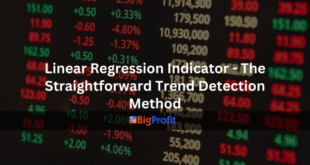As a Forex trader, your trading psychology and risk management abilities are of critical importance for success. Utilizing these abilities will allow you to avoid common errors such as revenge trading, premature exits and overtrading.
One of the greatest mistakes traders can make is ignoring their emotions, such as greed, fear or anger. They may allow these to dictate their decisions instead.
Self-awareness
As part of mastering trading psychology and risk management, self-awareness is an invaluable asset. Being self-aware enables you to better regulate your emotions and respond more rationally. Furthermore, self-knowledge helps identify strengths while simultaneously minimizing weaknesses.
Becoming fully self-aware can be difficult, yet it’s an invaluable skill that’s crucial in reaching higher levels of job satisfaction, becoming a better leader and strengthening relationships among colleagues.
As an example, being aware of yourself can help prevent saying or doing things which could hurt others in the workplace, like saying hurtful comments to a coworker or not responding to requests made of them. By being self-aware you’ll examine your behavior and examine why it has made you angry or bitter.
Self-awareness can do more than help you understand yourself: it can boost confidence, teach leadership skills and build resilience during tough times.
Studies have revealed that only 10-15 percent of people are truly self-aware. Yet this doesn’t have to be the case!
Tasha Eurich, PhD – a leadership expert and New York Times best-selling author – believes it takes both dedication and time to gain self-awareness. She recommends practicing quality micro-reflection – brief periods of introspection that take place alone – to develop self-knowledge.
Take for instance a stroll in nature can reduce stress and facilitate reflection. Writing in a journal is another effective way of helping identify your strengths and weaknesses and set intentions on how they will enhance your life.
Another way to foster self-awareness is by becoming familiar with your core values, passions and aspirations. These standards serve as guides for how you live your life – and whether or not they mesh well with the world around you.
Internal self-awareness is crucial, as it allows you to recognize when your core values don’t align with those around you, such as when a job doesn’t align with your passion for marketing or when an intense discussion with a colleague conflicts with your belief that kindness should be upheld.
Self-discipline
Development of self-discipline is crucial to mastering the mental game. This involves being able to resist temptations and focus on your goals despite temptation. Self-discipline also plays an integral part in combatting stress and anxiety that can contribute to poor performance or worse health outcomes.
To foster self-discipline, setting specific, SMART goals is the starting point. Doing this allows you to set a clear finish line, motivate you towards it, measure progress and recognize successes along the way.
Setting goals is integral to success in any endeavor, including trading. Without clear goals in place, sticking to your plan and maintaining motivation may prove impossible.
So for instance, say you want to purchase a house one day, but lack the discipline necessary to save up money for a down payment, this goal may become far less appealing and could tempt you towards spending it elsewhere, like on something like a new car or vacation.
Instead, set long-term goals that will benefit both yourself and your family. For instance, if your primary objective is buying a house, set savings goals to save for both down payments and retirement funds.
Make a plan and set goals: when planning, set yourself a schedule containing tasks you must accomplish daily in order to reach them, committing yourself to do them until your goal has been reached.
Self-discipline is an invaluable way to accomplish any goal, as well as enhance your life in many other ways. It can lower stress levels, improve mental wellbeing and boost happiness levels – three powerful weapons against all the stresses life throws your way!
Setting meaningful goals that you prioritize are an effective way of building self-discipline. They will act as guides that keep you on the right track and allow you to overcome any obstacles that come your way.
To foster self-discipline, focus on improving one skill at a time. This way, you can form a solid foundation before moving on to others that require improvement. Failure is part of success so don’t quit just because you fall short of meeting your goals!
Emotional control
Controlling emotions is one of the keys to succeeding at trading psychology and risk management. Doing so helps keep you focused on your strategy even when things don’t seem to go as planned.
Understanding what triggers your emotions is key to mastering this skill and learning to recognize them early so as not to feel overwhelmed and make poor decisions.
For instance, when prices are on an upward swing and traders become excited by it all, many become caught up in their excitement and assume they should capitalize on these good times by trading too enthusiastically – leading them into risky trades they could have easily avoided if they’d been more prudent. This can result in excessive exuberance and unnecessary losses on trades that might otherwise have been profitable.
Tilt is another common risk, whereby investors tend to act rashly without considering risk. This can be particularly dangerous when market volatility spikes and news becomes unpredictable; this may prompt fight-or-flight responses that result in losses that are hard to recover from.
Reacting out of fear or greed can impede sound decision-making and cause mistakes that cost money. Emotions may also be affected by your past experiences; therefore it’s essential to identify both strengths and weaknesses within this area.
Studies have demonstrated that the anterior prefrontal cortex (aPFC) is linked with emotion control. It has been observed to become active when individuals reassess an event or suppressing emotional reactions.
The anterior prefrontal cortex (aPFC) encodes multiple options during emotional regulation and helps people select the most effective strategy for any given situation. Therefore, reappraisal may prove useful while suppression may lead to detrimental results.
Research has also shown that activation of the anterior prefrontal cortex (aPFC) can help control high-value automatic emotional actions, as well as monitor alternative strategies during emotional regulation, thus permitting change between different strategies.
Stress management
Stress is a healthy response to changes and challenges; however, chronic stress left unmanaged can become problematic and undermine your health.
Everybody experiences stress differently and its source can vary considerably; commonly identified stressors include work, family and money issues. Some individuals may be particularly sensitive to certain forms of strain than others – for instance those living with mental health conditions or histories of abuse being more prone than most to experiencing distress.
Stressful situations can result in further health concerns, including cardiovascular disease or depression, so it’s crucial that you learn how to control it so it won’t have such an adverse impact on both your body and mind.
Step one in managing stress is recognising when and what causes it. Once identified, strategies can be utilized to stop it from worsening further and impacting health negatively.
Cognitive behavioral therapy (CBT), one of the most successful stress management techniques, has proven itself successful for individuals struggling to regulate their emotions or manage stressful situations. CBT can help increase awareness about how your response patterns change as a result of stressors such as trauma.
Mindfulness can also help to alleviate stress. By learning to focus on the present moment and release negative thoughts, mindfulness can become an effective means of controlling it over time. Although practicing it may initially seem challenging, its long-term benefits will make all the difference for managing stress effectively.
Thirdly, one effective strategy for managing stress is avoiding situations that set off stress responses in the first place. This means saying no to requests you find unreasonable, avoiding those that irritate you and doing what best serves your overall well-being.
Use these stress-busting techniques to break the cycle of anxiety and stay healthy and content. Furthermore, these tips will build resilience to face any stressors that come your way.
No matter your trading experience or mental game mastery level, understanding stress’ effect on trading decisions is critical to making better ones. Avoid emotional reactions while making decisions and analyzing markets, while also finding balance between trading activities and hobbies to reduce stress levels and keep mood high; doing this can boost performance while decreasing market volatility risk.
 BigProfit Profit through Algo & Technical Trading
BigProfit Profit through Algo & Technical Trading




